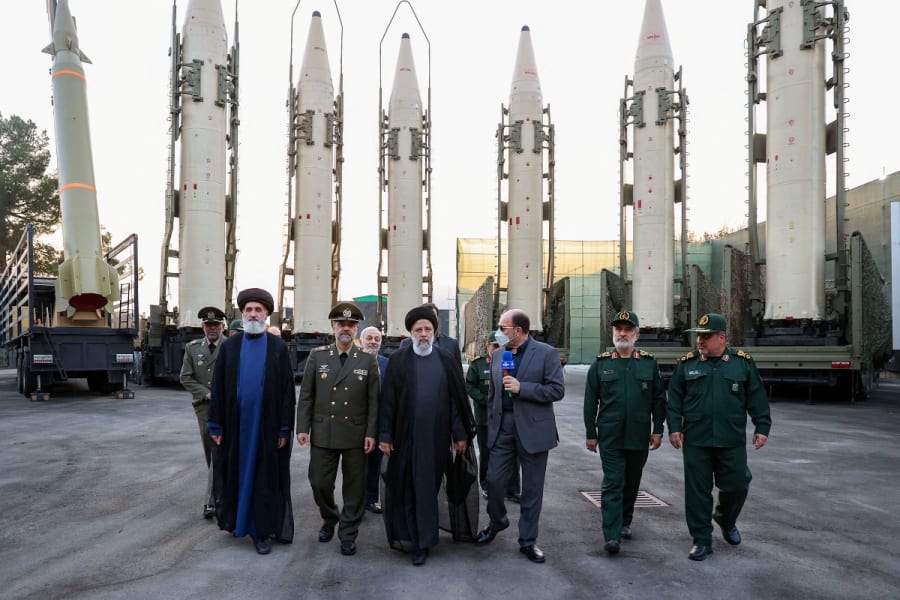Mixed messages? Iran transfers long-range missiles to Iraqi proxy militias shortly before nuclear talks - report
Regime walks tightrope between appeasment of domestic supporters & U.S.-Israeli military action

The Iranian regime last week transferred long-range missiles to its allied militias in Iraq for the first time, the British newspaper The Times reported.
The report followed shortly after the Iranian regime agreed to hold talks about its nuclear program with the U.S., with a meeting being set for this Saturday in the Sultanate of Oman.
The Times cited sources from regional intelligence services saying that the regime’s Revolutionary Guards (IRGC) transferred long-range, surface-to-surface missiles as well as Quds 351 cruise and Jamal 69 ballistic missiles with shorter ranges, significantly upgrading the arsenal of Iran’s proxy forces in Iraq.
In addition, the report cited a leader in the Harakat al-Nujaba militia who denied a story from Reuters earlier this week, which had claimed that the militias were ready to disarm in fear of U.S. airstrikes.
One explanation for the seemingly contradictory moves lies in the regime’s need to mollify its hard, ideological base of domestic supporters.
On the one hand, the U.S. massively increased its military forces in the region in recent months, which drew a series of threats by Iranian military officials who vowed strikes against U.S. bases in the region in case of an attack.
Moving long-range missiles to Iraq greatly expands Iran’s options to react to a potential U.S. attack on its nuclear program.
On the other hand, the move could serve to calm fears and internal criticism from the regime’s hardcore supporters.
According to Kasra Aarabi, Director of IRGC Research at the think tank United Against Nuclear Iran, the regime is paying a heavy price for agreeing to talks with the U.S.
“After Syria & a series of perceived ideological betrayals, younger radicals in the IRGC are increasingly turning on the regime’s leadership. Direct talks with who they see as Soleimani’s ‘murderer’ will not be without repercussions,” Aarabi wrote on X.
Members of this constituency have begun to question the ideological commitment of the IRGC leadership after Israel decapitated Hezbollah and destroyed Iran’s military presence in Syria.
“They openly began to question the ideological commitment of the IRGC’s oligarchy and the leadership’s hesitancy to strike Israel—and have suggested they are colluding with Israel’s intelligence services,” according to a recent article by Aarabi and Prof. Saeid Golkar in Foreign Policy.
“Even when the IRGC conducted unprecedented direct attacks on Israel, the ineffectiveness of the regime’s missiles and drones, which Iranian commanders had always boasted about, further demoralized the hard base that had always believed the regime’s propaganda about the IRGC’s capabilities.”
“The final straw, however, would take place over 700 miles from Iran, with the collapse of the Assad regime in Syria,” they wrote.
“And now, after being demoralized about Syria and all the other factors, the hard base is enraged at the fact that the Islamic Republic’s leadership is signaling that it would be open to negotiations with Trump,” which Supreme Leader Ali Khamenei has rejected so far.
The regime is walking a tightrope, trying to appease its domestic supporters while averting U.S.-Israeli military action against its nuclear program.
“Ayatollah Khamenei’s strategy is to keep the clock ticking until October when ‘snapback’ expires. If he’s able to do this, expect a deal post-October without substance that can easily be broken after Trump’s 4-years. If he fails to do this, war almost becomes inevitable,“ Aarabi estimated.

The All Israel News Staff is a team of journalists in Israel.
You might also like to read this:

















